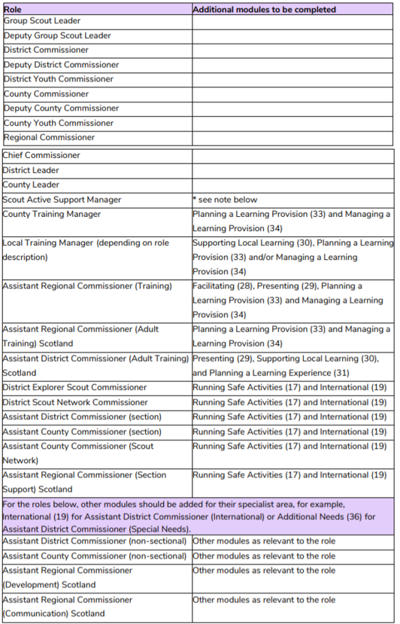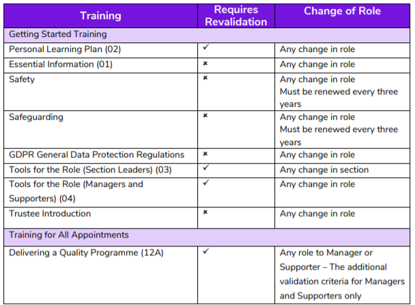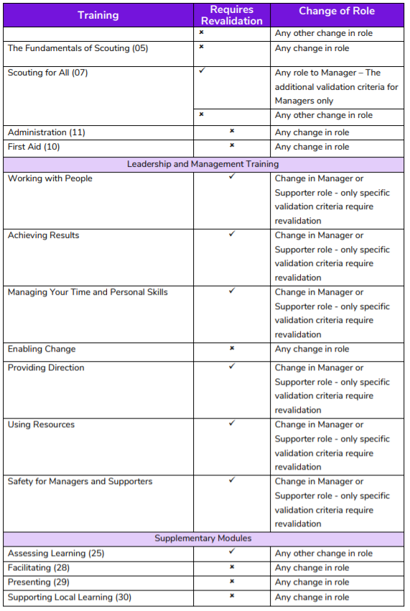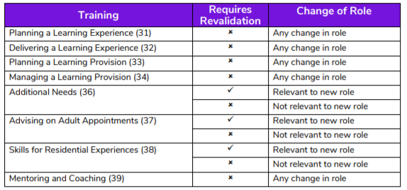Creating Your Personal Learning Plan
Creating Your Personal Learning Plan
This guide is designed to help you understand the training that you are required to complete for your role. You can use this guide to help create your Personal Learning Plan.
Agreeing a Personal Learning Plan
Once you have agreed your role description with your line manager you need to create a plan for your own training called a Personal Learning Plan (PLP). This should be created and agreed in partnership with your Training Adviser. If you haven’t agreed a role description yet, speak with your line manager to agree one. Find out more about example role descriptions, or they can be purchased directly from Scout Store.
There are five steps to creating a Personal Learning Plan:
1. Identify the training that is relevant to your role
2. Assess what learning you will need to complete
3. Decide the validation methods that will be used to demonstrate your ability to put learning into practice in your role and the timeframe in which you expect to complete each criteria
4. Meet and agree your plan with your Training Adviser
5. Complete and review
Step 1: Identifying the training that is relevant to your role
- Use the minimum training requirements section below and the Module Matrix to identify which modules you are required to complete for your role.
- Use your role description to identify any extra modules that you feel are relevant to your role, or that you would find interesting to complete
- If you are changing roles from another role in Scouting, you can use the Change of Role section to identify the modules that may require revalidating. If you have completed your training under the current Adult Training Scheme, it may not be necessary to revalidate certain modules if you have completed them previously.
The Module Matrix provides a summary of the modules that make up the Adult Training Scheme. The Module Matrix is colour coded to give you an indication of the types of roles likely to benefit from the training. The matrix is only a summary though and you should refer to the Minimum Training Requirements section that follows for more information on the training requirements for specific roles.
The training requirements for the different roles in The Scouts that undertake the Leadership and Management Training are outlined below.
All Managers and Supporters must complete the following training to achieve their Wood Badge:
Getting Started Training
- Personal Learning Plan (02)
- Essential Information (01)
- Safety
- Safeguarding
- Tools for the Role (Section Leaders) (03) Tools for the Role (Managers and Supporters) (04)
- General Data Protection Regulations (GDPR)
- Trustee Introduction (for trustees)
Training for All Appointments
- Delivering a Quality Programme (12A)
- Fundamentals of Scouting (05)
- Scouting for All (07)
- Administration (11)
- First Aid (10)
Training for Managers and Supporters - Managers and Supporters need to validate against the following key skill areas:
- Managing Your Time and Personal Skills
- Achieving Results
- Providing Direction
- Working with People
- Enabling Change
- Using Resources
- Safety for Managers and Supporters
For some appointments, there are additional modules which must also be completed as stated in the table below:

Click to see the table in full screen.
Those holding roles within a Scout Active Support Unit, including Scout Active Support Member, Scout Active Support Co-ordinator and Scout Active Support Manager should complete, as well as the training indicated above, those modules of the training scheme which are relevant to the nature of their role in the Unit which they belong to.
This could include Tools for the Role (Section Leaders) (03), Running Safe Activities (17), or any other relevant module(s). The service agreement for a Scout Active
Support Unit will outline the support provided by the Unit and will help to determine which training will be relevant for its members.
You are encouraged to look at other modules that may be relevant to your role but do not make up the minimum requirements for your appointment. These modules may be completed in addition to the minimum requirements, or as ongoing learning.
It's not unusual for an adult to change roles in Scouting. To ensure you have the correct skills and knowledge you may need to revalidate certain training. If you have completed your training under the current Adult Training Scheme and are changing roles, it may not be necessary for you to re-validate certain modules because you have completed them previously.
Each module on the following pages has a “requires revalidation” box. A tick means that you need to validate the module again and a cross means that you don't.
In some cases, the need to re-validate will depend on which role you are moving from and to. Roles are split into three categories:
- Section Leader (anyone working in a section)
- Manager (e.g. Group Scout Leader, District Commissioner, County Commissioner, County Training Manager, District Explorer Scout Commissioner etc.)
- Supporter (e.g. Assistant District/County Commissioner)
The table below shows which training will require revalidation when a volunteer changes role in Scouting.
Part 1 - see the table in full screen.

Part 2 - see the table in full screen.

Part 3 - see the table in full screen.

Step 2: Assessing your learning
It's likely that you already have skills and knowledge that you have gained outside of Scouting that can be used to validate some of your Scout training. This means that for some modules you may not need to do any extra learning or may only have learning to do for certain topics.
The Check Your Knowledge chart included in the module pages below will help you to look at what you already know, and with the help of your Training Adviser, decide what learning you need to complete for each module. The chart has been designed to reflect the learning objectives of each module. Your Training Adviser will use this, along with the discussions you have at your initial meeting, to create your Personal Learning Plan (PLP) and agree it with you.
For the Leadership and Management Training there are some additional Learning Recommendations (Appendix 4) that can be used as guidance as to what learning might be recommended for each role.
The Scouts’ Adult Training Scheme recognises prior learning. You may already have skills and knowledge gained through your education, employment, life experiences or other voluntary roles, which you can apply to your new role in Scouting. If you already have the knowledge, skills and abilities covered by a module you will not be required to complete the learning for the module. If you have some of the skills, or are unsure about some aspects, you may be able to complete learning for just those bits that you need.
You do, however, still need to demonstrate that you can use these skills in your Scouting role. This is shown through the process of validation. As part of the planning process for your training you will agree with a Training Adviser how you will validate each module.
As part of its Youth Programme, The Scouts operates a Young Leaders’ Scheme. The scheme gives young people in the Explorer Scout Section (aged 14-18) the opportunity to act in a leadership role in one of the three sections for younger members. As part of this scheme, Explorer Scouts are required to do some training to support them in their role.
If you have previously been a Young Leader you may have done training which covered subjects such as the quality programme, child protection, first aid, practical skills, challenging behaviour and leadership skills, giving you the skills and knowledge that you needed to act as part of the leadership team as a Young Leader.
Young Leader training does not directly translate to the Adult Training Scheme, and so cannot be used to validate the modules of the scheme. However Young Leader Training provides some prior learning for the modules of the Adult Training Scheme. Your Training Adviser should discuss and recognise this prior learning when creating your Personal Learning Plan.
The Adult Training Scheme offers a number of learning methods for each module, specified on the module pages below. The Getting Started modules and Training for All Appointments modules have a choice of two or more methods that can be used to access the learning. You may be able to go on a training course, use e-learning, workbooks, videos, read a book or get another adult in Scouting to help you or teach you a skill. For some roles the Regional Services Team in England induction, will provide an additional learning opportunity. Each method will cover the same learning objectives; therefore, you should choose the method that is most suitable for you through a discussion with your Training Adviser.
The Leadership and Management training is delivered via two methods:
- Independent Learning - this will cover the knowledge required by learners to understand the key topics of leadership and management and related Scouting processes. The learning will be accessed via a variety of methods, including videos, e-learning and workbooks.
- Skills courses – this will consist of three courses (Skills of Management, Meeting the Challenges and Achieving Growth) where learners have an opportunity discuss and demonstrate different skills relating to leadership and management.
The Module Matrix shows how the independent learning and skills courses are aligned with the validation areas for the Leadership and Management Training. More information on the independent learning units and skills courses can be found below in the Learning Opportunities for Leadership and Management Training section of this guide.
It's important that learners complete the Independent Learning Units prior to attending the relevant skills course. The information in the Independent Learning Units provides good background knowledge which is built upon in the skills courses. It is also recommended that where possible you complete the Skills of Management weekend first, again, many of the skills and concepts are built upon in later courses.
For the Leadership and Management training, the principles of acknowledging prior learning are still to be adhered to but there are no alternative learning methods to the Independent Learning and Skills Courses. With your Training Adviser, discuss the learning objectives for the Independent Learning Units and skills courses to decide what learning you require.
Step 3: Agreeing the validation methods
Validation is the process where you show that you can put your knowledge and skills about the topics covered in a module into practice in your role in Scouting. You will need to validate all of the modules required for your role, regardless of whether you have gained skills through learning or through previous experience.
There are a number of different validation methods for each module; you will work with your Training Adviser to decide which is most appropriate for you. Validation should reflect the activities of your normal Scouting role and should be backed up by evidence. The different aspects of your role, for example running meetings, planning programmes, leading and managing others, will show your abilities and knowledge. Validation is essential for every module in the Adult Training Scheme.
There are a number of methods of validation, for example:
- A visit from your Training Adviser to observe you carrying out an activity
- A written or verbal statement to your Training Adviser from an observer
- Paperwork created for the role such as programme plans, letters to parents, instructions for activities and risk assessments
- Notes from activities or meetings
- Obtaining a qualification, such as a first aid certificate or nights away permit
- Completing a questionnaire
- Discussion with your Training Adviser
- Photos or videos of a validation activity
- Presentations to adults or young people in Scouting
These are just some examples of validation methods. There are other methods, or variations of these that you might want to use. These can be agreed between you and your Training Adviser.
In order to validate each module, you will need to produce evidence that shows that you have completed the agreed validation criteria. Included in the Adult’s Personal File (APF) for each module are examples of evidence you might wish to use in completing your validation. This list is not exhaustive and should be used to generate ideas and agree how validation will be carried out with your Training Adviser.
Once validation criteria and evidence have been agreed, you will need to complete the validation criteria and gather the appropriate evidence. When you next meet with your Training Adviser you will need to reflect on this evidence with them so that the module can be validated and completed.
Step 4: Meeting and agreeing your plan with a Training Adviser
For this stage you will need to meet with your Training Adviser to finalise and agree your plan. This is also your opportunity to discuss any questions you have from steps one and two. Using your draft Personal Learning Plan, agree with your Training Adviser the modules, courses and independent learning that are relevant to your role.
At the first meeting you may not be able to agree the learning method, validation, and timescale for every aspect of your training. It is suggested that you plan between six and twelve months ahead, taking into account any opportunities for validation or learning that may arise in that period.
The Personal Learning Plan is your formal record of completing your training and so it will need to be kept safely. Any Training Advisers that are supporting you will also need a copy for their records. Your Personal Learning Plan is recorded in the membership database called Compass, where it is stored and updated as you work through your training. The Personal Learning Plan can be completed by your Training Adviser directly on to Compass when you meet to agree your plan.
Step 5: Complete and Review
As you work through your training, make sure that each area you validate is signed off on your Personal Learning Plan by the person who validates it. At least once every six months, it's recommended that you review your progress with your Training Adviser and agree a plan for the next six months.
Once you have validated all the areas of your Personal Learning Plan for your Wood Badge you will need to agree your plan for Ongoing Learning (including mandatory ongoing learning) with your line manager. Every adult who holds an appointment for which a Wood Badge is required must participate in a minimum of five hours ongoing learning each year. This is to ensure they continue to acquire new skills and keep up to date with new trends and policies. Ongoing learning must be at least five hours per year, calculated over the length of the appointment.
Once you have completed your Personal Learning Plan and agreed your plan for Ongoing Learning you will be eligible to be recommended to be awarded the Wood Badge.
Adult Personal File for Managers and Supporters
Download the file